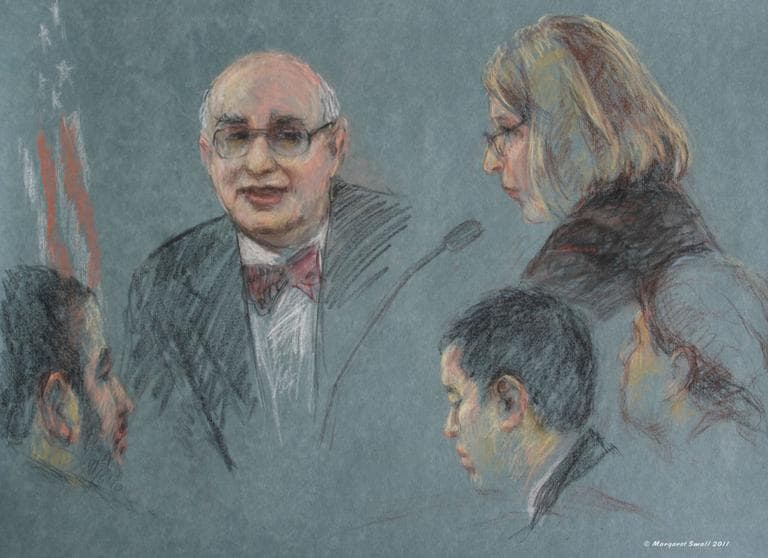Advertisement
In Mehanna Trial, Defense Saves The Star Witness For Last
Resume
The judge in the trial of the Sudbury man accused of supporting terrorists said the jury will begin their deliberations Friday.
Defense attorneys for Tarek Mehanna have rested. But they saved their star witness for last.
Bow-tied, bald, and wearing round glasses, Marc Sageman looks like an egghead who could be making the rounds of a hospital ward. In fact, he's a doctor as well as a sociologist, but his back story is the stuff of movies: a flight surgeon in the U.S. Navy and a CIA case officer in Afghanistan coordinating America's covert operation against the Soviet occupation.
"In popular language, I was a spymaster," he said, smiling as he answered a question from defense attorney Janice Bassil.
"He is perhaps the leading international counter-terrorism expert," Bassil said.
And as such, Sageman had been recruited to appear as a defense witness, which he was doing for the first time, to help show that Mehanna is not a terrorist.
"(The terrorism expert) was very clear that the videos have not been a recruiting tool for al-Qaida. The greatest number of volunteers occurred at a time when videos and Internet didn't exist."
Janice Bassil, Tarek Mehanna's defense attorney
This was all the more remarkable, because Sageman has studied al-Qaida from its birth in 1988; he knew and lived with all the major commanders of the mujahideen who were fighting the Soviet army. He became a forensic psychiatrist and has seen his writings included in Army training manuals. He consults for the Defense Department, the Department of Homeland Security and the CIA. He has classified security clearance, which government witnesses don't have.
He's soft-spoken and French-accented, but a big cannon the defense has wheeled out against what it calls "government scare tactics."
"There were a lot of things that the government presented. They threw pictures up, they threw videos up, they threw audios up (sic), but there was no context for the jury about what those things really meant," Bassil said.
With Sageman, the defense hoped to batter the testimony of the counter-terrorism consultant who was the prosecution's expert witness last week. Evan Kohlmann, who runs his own international consulting company, testified that the kind of videos and documents that Mehanna translated and promoted online were a crucial function, allowing al-Qaida to recruit and incite young men to violence.
The self-confident, young Kohlmann testified to the effect that if you watch those videos, you go out and bomb targets.
When Sageman took the stand for the defense, he was clear.
"Does al-Qaida use the Internet to recruit?"
"No," he replied, "that's not how people join al-Qaida."
"How do people join?"
"It's really a bottom-up phenomena," Sageman answered.
Sageman said that mainstream news media had far more impact than the videos of the sort that Mehanna translated for the Internet. By covering the American mistreatment of prisoners at Abu Ghraib in Iraq and the rape and killing of a teenage girl by U.S. soldiers, mainstream media had evoked moral outrage that was a more effective recruiting tool.
"Marc Sageman was very clear that the videos have not been a recruiting tool for al-Qaida," Bassil said outside of the courthouse. "The greatest number of volunteers occurred at a time when videos and Internet didn't exist."
Under cross-examination by federal prosecutor Jeffrey Groharing, Sageman acknowledged he had once talked about writing a book with the other consultant he was now disparaging.
"It was over a few glasses of wine," Sageman said with annoyance.
The defense tried to smooth out the wrinkles under re-direct questioning. Sageman emphasized his extensive search for "the ground truth," studying and comparing people who turn to violence with those who don't.
"I use a scientific method," he told Bassil.
"And how does that compare with the government's witness, Mr. Kohlmann?" she asked.
"He tells stories," Sageman replied.
It was a favorable note on which to rest the defense that Mehanna isn't a terrorist and isn't inciting violence.
More:
This program aired on December 15, 2011.
